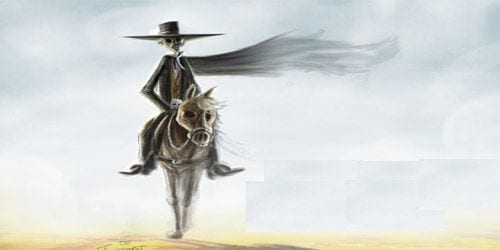
Westerns like Oni Press’ The Sixth Gun and DC’s Jonah Hex have garnered praise and loyal fans. Horror books like Image’s The Walking Dead and Vertigo’s American Vampire have seen robust sales. In the case of Zeke Deadwood: Zombie Lawman, the book has combined the Western and Horror genres to produce a dramatic mashup of six shooters and ungodly monsters.
Two years ago, SLG Publishing released a comic that did the same, but where The Sixth Gun used the terrifying to lure fans, SLG’s Zeke Deadwood: Zombie Lawman uses comedy. Now re-released in time for the long awaited follow-up, Zeke Deadwood is ready to tickle the funny bones and offend the nostrils of fans looking for a cross genre lampoon.
The best of both worlds. That’s the simple explanation of the mashup phenomenon. The exact explanation is a bit more complicated. Music mashups have existed for a long time. But in 2009, something new appeared on the pop culture scene: the mashup novel, combining classic literature with a popular genre (Pride and Prejudice and Zombies and Abraham Lincoln, Vampire Hunter).
The summer of that same year, Zeke Deadwood was originally released. Not remotely a work of classic literature, nor inspired by it, but having the aesthetic qualities of several classic elements of two popular genres, Zeke Deadwood touched upon the popular mashups but excelled more as parody, the type of which only comics (and sketch comedy shows) can produce.
Created by T.A. Boatwright and Ryan C. Rubio, the same creative team behind the Hammer horror film inspired Cemetery Blues, Zeke Deadwood features the exploits of an undead lawman out to clean up a small western town from a villainous band of outlaws. It’s Saturday afternoon Western action combined with B-movie horror, camped up with running gags, crazy scenarios and genre clichés. And it’s charmingly creepy.
If you’re a fan of Eric Powell’s The Goon and Billy the Kid’s Old-Timey Oddities, then the tone of this genre mashup is immediately apparent and enticing. Seemingly from a very common place, Zeke Deadwood is just as thematically familiar and well crafted. It is paradoxically both reverential of its roots and discourteous as a lampooning of the style of old-timey radio serials.
The opening panels set the tone, as the story of Zeke Deadwood is presented as the exploits of a radio serial, calling to mind The Lone Ranger and The Cisco Kid. Many early critics of the book mistakenly assumed that crossing time-periods was a mistake by Boatwright and Rubio, but the creators’ intent is to send readers back in time to a re-imagined point in our pop culture history and present a story within a story (the CBS sitcom How I Met Your Mother uses a similar narrative technique).
The pre- and post-“Zeke” scenes are nothing more than bookended set-up and punch-line for the overall adventure of a zombie lawman. The idea that this in any way distracts from the book’s plot is ridiculous and short-sighted of the overall theme. It’s a zombie cowboy saving the good people of the western frontier–the ridiculousness is built-in.
There’s an air of ugliness to the artwork that is in keeping with the concept, yet at the same time Boatwright and Rubio present clean layouts and pencil lines. The scenes are cartoony without being too comical, as the action presented is certainly comical enough. The inks employed by the two are what really make the pages standout. There is an earnestness to the scenes, translated from the script to the dialogue and artwork that shines through on each page. This is serious business for the creators. They did not create this character and story on a whim, but thought long and hard on how to make the entire concept work. The evidence of that is in vivid black and white; from page one to page twenty-two.
If Zeke Deadwood has any place in the Western genre, it’s certainly cemented by movies like Paint Your Wagon and TV shows like The Adventures of Brisco County, Jr. And if it has any place in the Horror genre, it’s made relevant by novels like Pride and Prejudice and Zombies and comics like The Goon. Like those artifacts of pop culture, “Zeke” owes its origin to the influences of several styles. It’s Clint Eastwood undead. Zeke Deadwood: Zombie Lawman is novel, authentic and several other adjectives. It’s Western-Horror-Comedy – can we have more please? Thankfully, yes, we’ll get a second helping soon.

![Call for Papers: All Things Reconsidered [MUSIC] May-August 2024](https://www.popmatters.com/wp-content/uploads/2024/04/all-things-reconsidered-call-music-may-2024-720x380.jpg)



